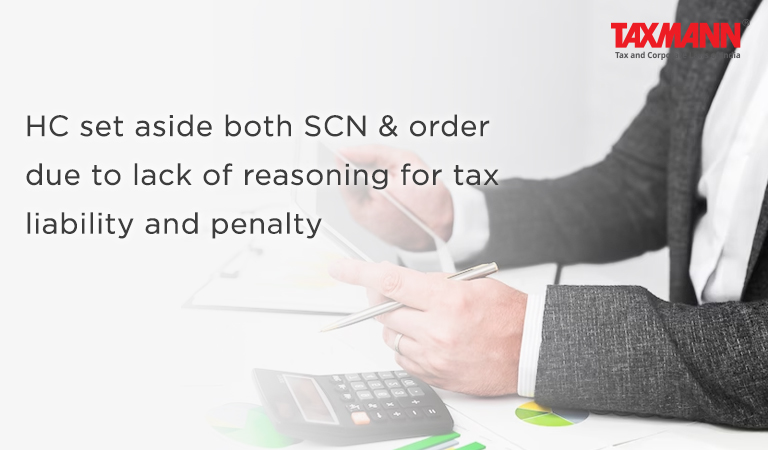HC set aside both SCN & Order due to lack of reasoning for tax liability and penalty
- Blog|News|GST & Customs|
- 2 Min Read
- By Taxmann
- |
- Last Updated on 13 March, 2023
 Image
Image
Case Details: Ram Prakash Chauhan v. Commissioner of Delhi - [2023] 148 taxmann.com 168 (Delhi)
Judiciary and Counsel Details
-
- Vibhu Bakhru & Amit Mahajan, JJ.
- Ms Smriti Sinha, Satyam Thareja, Ms Vasundhara Nagarath & Ms Shriyanshi Pathak, Advs. for the Petitioner.
- Satyakam, Standing Counsel for the Respondent.
Facts of the Case
The petitioner operates a steel/iron bar trading company. He purchased goods from Mahendra Steels and sold them to S.K Integrated Consultants. The aforementioned goods were being transported straight from M/s Mahendra Steels to M/s S.K. Integrated Consultants. As a result, a Bill-to-Ship-to model is created. The GSTN of petitioner is plainly stated in the E-way bill, but because the transaction is Bill-to-ship-to, the address mentioned in the E-way bill was that of the recipient of goods. The truck transporting the goods was detained because the documents discovered were defective. However, according to the respondent’s counter-affidavit, the products were detained because they were not accompanied by an E-Way Bill.
The reasons stated in the show cause notice and the detention order for detaining the goods as prima facie documents are both defective, and an order of demand for tax and penalty was issued on the same day. Because the petitioner required the goods immediately, he paid the tax and penalty and demanded the goods to be released. Following that, the petitioner filed an appeal with the Appellate Authority, which dismissed the appeal on the grounds that the Proper Officer had categorically pointed out the discrepancy in the form of mis-Match between the E-Way Bill and goods in Movement in the order, which formed the basis for penalising the Appellant.
High Court Held
The SCN and detention order lacked an explanation of the reason for detaining the goods, raising the tax and penalty liability, and simply stated that the documents submitted are found to be defective, with no specific flaw mentioned. The Honourable High Court set aside both the Show Cause Notice and the demand order imposing tax and penalty, and remanded the case to the relevant GST officials to be decided afresh.
Disclaimer: The content/information published on the website is only for general information of the user and shall not be construed as legal advice. While the Taxmann has exercised reasonable efforts to ensure the veracity of information/content published, Taxmann shall be under no liability in any manner whatsoever for incorrect information, if any.

Taxmann Publications has a dedicated in-house Research & Editorial Team. This team consists of a team of Chartered Accountants, Company Secretaries, and Lawyers. This team works under the guidance and supervision of editor-in-chief Mr Rakesh Bhargava.
The Research and Editorial Team is responsible for developing reliable and accurate content for the readers. The team follows the six-sigma approach to achieve the benchmark of zero error in its publications and research platforms. The team ensures that the following publication guidelines are thoroughly followed while developing the content:
- The statutory material is obtained only from the authorized and reliable sources
- All the latest developments in the judicial and legislative fields are covered
- Prepare the analytical write-ups on current, controversial, and important issues to help the readers to understand the concept and its implications
- Every content published by Taxmann is complete, accurate and lucid
- All evidence-based statements are supported with proper reference to Section, Circular No., Notification No. or citations
- The golden rules of grammar, style and consistency are thoroughly followed
- Font and size that’s easy to read and remain consistent across all imprint and digital publications are applied



 CA | CS | CMA
CA | CS | CMA
